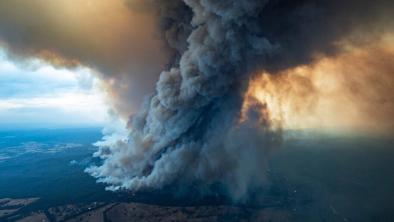2019 was Australia's hottest year on record – 1.5C above average temperature

The year 2019 was the hottest on record for Australia with the temperature reaching 1.52C above the long-term average, data from the Bureau of Meteorology confirms.
The year that delivered crippling drought, heatwaves, temperature records and devastating bushfires was 0.19C hotter than 2013, the previous record holder.
Climate scientists told Guardian Australia that climate change pushed what would have been a hot year into record territory, driving heat extremes and the risk of deadly bushfires.
The Bureau of Meteorology data shows the average temperature across the country was 1.52C above the long-term average taken between 1961 and 1990. The second hottest year was 2013, followed by 2005, 2018 and 2017.
The data, from the bureau’s long-term ACORN-SAT data, will be used as part of the bureau’s annual climate statement due for release on 9 January.
Prof Mark Howden, the director of the ANU Climate Change Institute, said the continued rising levels of greenhouse gases in the atmosphere, caused mainly by burning fossil fuels, was the underlying driver of the heat.
He said: “It’s very clear that greenhouse gas emissions are changing the radiation balance of the Earth. Other contributors are minor in comparison.”
He said two other climate systems had also played a role in delivering the record hot year.
The Indian Ocean Dipole system had drawn moisture away from the centre of the continent, causing extra heat to build there. Another system known as the Southern Annular Mode had also contributed to the heat.
The data also shows that 2019 was the hottest year on record for New South Wales, with temperatures 1.95C above the long-term average, beating the previous record year, 2018, by 0.27C.
Western Australia also had its hottest year, with temperatures 1.67C above average, beating the previous 2013 heat record by 0.58C.
The Northern Territory and South Australia both had their second hottest years, with 2019 coming in fifth hottest for Victoria and sixth hottest for Queensland, according to the data. Tasmania had a relatively cool year, but was still 0.41C above the long-term average.
The previous summer of 2018-19 was the hottest on record. The spring of 2019 also delivered the worst bushfire weather since at least 1950, when the Forest Fire Danger Index data began.
On Wednesday 18 December, Australia experienced its hottest day on record with an average maximum temperature of 41.9C (107.4F), beating the previous record by 1C that had been set only 24 hours earlier.
Related Content





